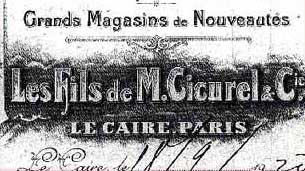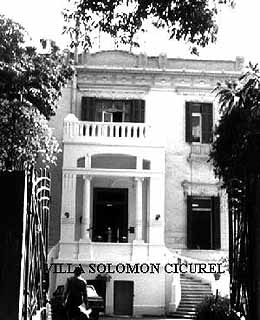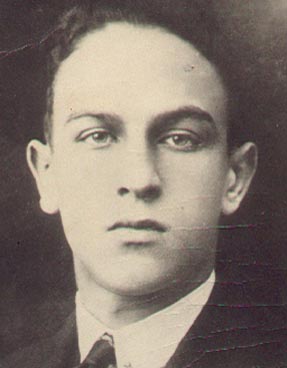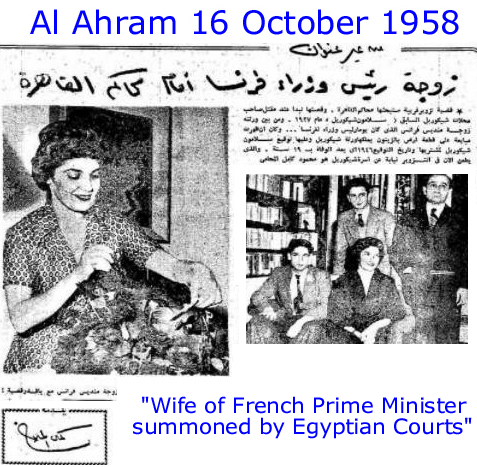

Solomon M. Cicurel and his villa on Giza's al-Rimaha Street
|
|
|
|
|
Cheers to our "talented" literature prize awardee. Your pain his gain !!!
|
|
|
EGY.COM - GIZA
|
|
|
|
|
Cairo Times, 20 April 2000 |


Solomon M. Cicurel and his villa on Giza's al-Rimaha Street
Cairo talked about little else during the Khamsin season of 1927. Not since the May 1921 Alexandria trial of murderesses Raya and Sakina (serial killing sisters) had Egyptian society been so gruesomely entertained. And now it was the brutal Hollywood-type murder of Solomon Cicurel that would absorb the nation's attention for the next few months. This real-life drama had all the trappings of a fantastic spectacle: famous household name, money, Nileside villa in exclusive suburb, politics and death row. Because radio was only just making its debut, information-seekers were once again relying on broadsheets and gossip, with a heavier emphasis on the latter.
But if everyone was looking for a sensationalized spin to the celebrity murder none was forthcoming in the press. La Bourse Egyptienne like other leading publications reported an 'open and shut' case. At least this is what the thoroughgoing investigation led by Cairo's chief inspector Sir Thomas Russel Pasha revealed. What started out as a poorly planned burglary had deteriorated into a bloody murder. The four criminals apprehended within hours of their crime had confessed in toto.
Seemingly, the victim and his wife were asleep in their upstairs master bedroom when four men stormed their bedroom. Forced to inhale ether, Elvire Toriel was rendered unconscious, whereupon the assailants bludgeoned her resisting husband setting off with the jewelry. By thetime the convulsed wife came to, it was all over. Next to her in the blood-drenched marital bed lay the corpse of her husband.
But if the crime was portrayed as a simple burglary, albeit at the home of one of Cairo's richest merchants, the homicide kept everyone on edge. Notwithstanding the fact that Egypt's top investigators were assigned to the case. Meanwhile, cime-watchers refusing to settle for nothing less than sex and scandal claimed it was all too pat. If some bemoaned how the inquest had been sanitized, the majority would however agree it had been inexorably politicized both inside and outside parliament.
Under the regime of Capitulations, foreigners in Egypt were exempt from local laws and taxes. Its direct linkage to the question of sovereignty had re-surfaced in the Cicurel murder trial. "How" cried Al-Ahram "could it be that the Italian defendants--Edouardo Moramarco and Grimaldi Dagaro--are tried in Ancona, Italy; their Greek accomplice--Anesthi Christo-appears before a judge and jury sitting at the Greek Court in Alexandria; and the fourth criminal shows up in an indigenous Egyptian court?" "By distinguishing between criminals according to their nationalities and not according to their deeds, Capitulations was making a mockery of the justice system" wrote the Egyptian Gazette.
Because the death penalty was not applicable in Italy or Greece, the stateless Dario Jacoel, 21, faced the hangman alone. He was buried in a corner of the Jewish cemetery of Bassatine not far from where his Jewish victim rested in a lofty crypt.
As could be expected under the circumstances, rumors and innuendoes persisted even after the trial. These were fueled by new evidence during the investigation claiming Solomon Cicurel's disgruntled ex-chauffeur--Anesthi Christo-had publicly sworn vengeance against his former employer following his summary dismissal. More humbuggery by those who claimed it was all a sex cover-up. They pointed out how Cairo's leading department store only hired gorgeous females. That when a shopgirl caught the simultaneous fancy of both the boss and a panting subordinate, the dumped older suitor settled the score his own way.
Eventually the scalding homicide was buried in Al-Ahram's page 8 so that readers and everyone else could get on with their lives. The wealthy Madame Cicurel remained a single mother. Whereas a daughter died relatively young another married French prime minister Pierre Mendes-France. Solomon's only son Raymond also moved to France.
In Cairo, Villa Cicurel remained intact and many decades later it became part of Cairo University's School of Oriental Studies. Situated behind the Swissair Building, the villa stands opposite both Giza's Mudireyet Amn or Security Headquarters and the Missaha--Survey Department.
If little or nothing is known today of the three foreign defendants, the legend of Dario Jacoel lives on. Consider the following e-mail dated March 2000 sent from Houston, Texas by another Dario. "My great-uncle was the Dario who killed Salomon Cicurel. My father Leo Jacoel told me a very different story than what I read in your story (Ahram Weekly, 15 December 1994). Dario was having an affair with the wife of Salomon. When she tried to break it off he became very angry. My hot-blooded great-uncle told her he would have her in the presence of her husband. Which is why Dario went over to the house to rape her in front of Salomon. With his friends to help him they restrained the husband while Dario assaulted the wife. One of the other men stabbed Salomon with a screwdriver several times. The blood that was on Dario however was that of Mrs. Cicurel. She had been menstruating during the rape."
Looks like Cairo's hottest murders have a way of hanging on.



politically-based smear campaign against France deploying sensationally misleading
banners this time concerning Lili Solomon Cicurel (Madame Mendes-France)
Reader's Comments
Subject: CICUREL MURDER
Date: Sun, 17 Dec 2000 20:48:12 -0600
From: "LEVON K. TOPOUZIAN"
I read the Cicurel story published in the Cairo Times of 20 April 2000 bearing your signature. I was chagrined! You are an excellent newspaperman and this absolute unadulterated hearsay and accusation with NO FACTS is not befitting and should have been labeled as HEARSAY. A correction by you "stating hearsay" is absolutely in order!
Levon K. Topouzian
Northwestern University, Evanston, IL. USA
L-Topouzian@Northwestern.edu
|
|
|
|